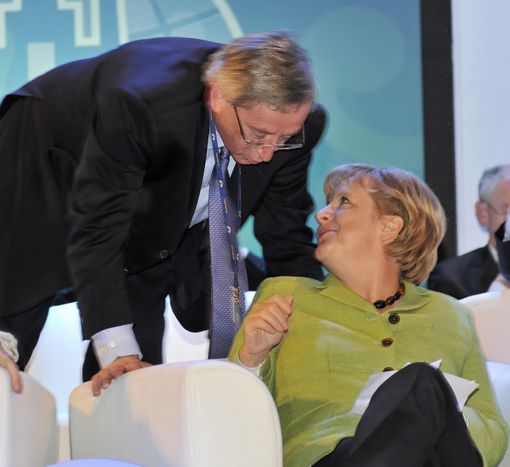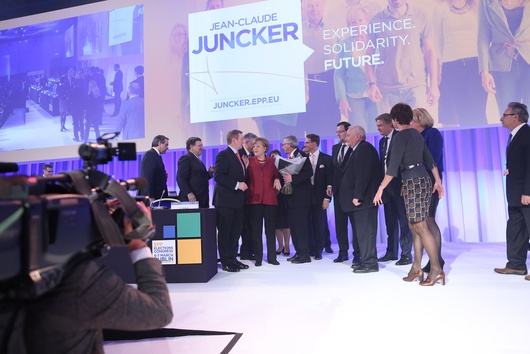
A look back on what finally led Merkel to support Juncker
Published on
Translation by:
Neeraj NagarkattiUnless there is dramatic turn of events, Jean-Claude Juncker seems well on his way to becoming the next President of the European Commission. His appointment was far from certain, while his candidacy was still being debated by European leaders. Angela Merkel also sided with the sceptics, raising many questions, before finally backing the Luxembourger.
At the very least, you could say that Jean-Claude Juncker’s candidacy has sparked a lot of public interest and not just across the Channel. It is well known that the British Prime Minister, David Cameron, who is largely opposed to further EU integration, has been squeezed from all sides. He is cornered by a largely pro-EU Independent national press, by the Euro-sceptic wing of his party and finally, by the rapid rise of the United Kingdom Independence Party (UKIP). In particular, he was swept away and set ablaze by the highly controversial UKIP leader, Nigel Farage, who has adopted a considerably hard-line position against the Spitzenkandidat [Front-runner in English — Translator] of the European People’s Party (EPP). But this stance has left Britain more politically isolated from the Union and Mr Cameron is becoming an increasingly lone figure within the EU, especially since the appointment of his adversary.
An opposition divided
Though, it wasn’t until very recently that the British were so isolated. Others also seemed less inclined by Jean-Claude Juncker; this 'man of the past', a federalist, reduced to ashes over the years at the head of the Eurogroup, who, according to persistent rumours, was a smoker and a compulsive drinker. On top of this, was the hasty end of his premiership last year, following the tawdry affair of mass surveillance programmes within the Grand-Duchy.
So, the Hungarian and National Conservative Viktor Orban, remained firmly opposed to the Luxembourger and supported Mr Cameron until the very end. Before they finally made a decision in his favour, the conservative Dutch and Swedish Prime Ministers, Mark Rutte and Fredrik Reinfeldt, the Social-Democrats Matteo Renzi, President of the Council of Italian ministers and the French President, François Hollande, were leaning towards a 'surprise candidate', following talks between EU leaders behind closed doors. Similarly, the German Chancellor, Angela Merkel, didn’t exactly hold the likely future President of the European Commission close to her heart, and rather reluctantly changed her stance.
Tense relations
Indeed, Angela Merkel has long preferred the French and neo-liberal Christine Lagarde, the current Director General of the IMF, over anyone else. Lagarde is known for her acclaimed loyalty, embodied by her famous catchphrase “Use me as you wish”, written in a letter pledging her allegiance to Nicolas Sarkozy. However, it’s not as though you can identify this personal quality in the Luxembourger.
Already when Angela Merkel was opposed, the cooperation between the then Prime Minister of Luxembourg and the previous Social-Democrat Chancellor, Gerhard Schröder, irritated her considerably. The height of displeasure was undoubtedly at the Tervuren Summit in April 2003, when Germany, Belgium, France and Luxembourg made a call for unity to implement a common European Security and Defence Policy. Later, when the Luxembourgish Foreign Minister, Jean Asselborn, a Social-Democrat, lashed out at Angela Merkel and her government's policy. At no point was he brought into line by Jean-Claude Juncker.
Or during the 2009 European elections, when the Luxembourger’s candidacy was turned down in favour of the Belgian, Herman Van Rompuy, even though Mr. Juncker fulfilled all the criteria to become the first 'Mr. Europe'. Since then, Juncker keeps insisting that this decision was taken in part from an intense marked animosity towards him from the former German physicist.
Why mend fences now?
 And so, the unthinkable happened. Angela Merkel supported Jean-Claude Juncker’s candidacy, in spite of numerous critics within the Bundestag [German Parliament - Translator], especially on the German Radical Left. Even more surprising is that the German Chancellor, who was still worried about reaching a unanimous decision within the Council of Europe, announced that Britain’s opposition, “wouldn’t have been such a drama if we had qualified majority voting”.
And so, the unthinkable happened. Angela Merkel supported Jean-Claude Juncker’s candidacy, in spite of numerous critics within the Bundestag [German Parliament - Translator], especially on the German Radical Left. Even more surprising is that the German Chancellor, who was still worried about reaching a unanimous decision within the Council of Europe, announced that Britain’s opposition, “wouldn’t have been such a drama if we had qualified majority voting”.
A strange U-turn which raised many questions. For starters, what accounted for such a shift in opinion? On Wednesday June 25, before the German lower chamber, Angela Merkel gave a preview of the negotiated package. “Germany remains the stabilising factor and the engine of growth in the Eurozone, but also in the European Union,” she stated in the Reichstag, asserting her staunch opposition to the relaxing of the stability and growth pact. A position that seemed to influence the new president of the EU Council, Matteo Renzi, who has taken over from the Greek presidency.
Another point was the Energy Transition Law in Germany, which aroused deep scepticism from Brussels, especially on the tax rebate system made on energy favouring German industry. Furthermore, the German government and its Minister for Economic Affairs and Energy, Sigmar Gabriel, had to amend draft legislation on renewable energy at the last minute, to be voted on June 27th, in order to comply with the Commission’s requests. In this context, it wouldn’t be surprising to see the current German commissioner, Günther Oettinger, who was Head of Energy Policy at the Commission, keep his post, to best represent Germany’s interests in the next parliamentary term.
Ultimately, it is quite likely that the strategy used by the occupant of Number 10 Downing Street was counter-productive, even though at the outset, a certain number of European leaders supported the British stance. By simply attacking the EPP candidate so aggressively, David Cameron forced political leaders to take a stand, but not the one he hoped for. And for good reason too, the political situation was defined in part on one hand, by pressure from public opinion, whose views were conveyed through the media and politics, and on the other hand, by foreign relations. However, the German press, just like a wide cross-section of German parliamentarians, favoured the Spitzenkandidaten. Turning down the candidacy would have been complicated in terms of political communication, unless a majority of member states had been opposed to him.
Yet, seeing Mrs Merkel’s shift in emphasis, some heads of state and government, while close to the British stance, preferred to avoid conflict with their close neighbours, and with public opinion, and in doing so, still showed their support for the Luxembourger. David Cameron lacked judgement in explaining the specific needs of his country to his European counterparts, namely, a vast section of the Euro-sceptic media and political leaders. Unless of course, it was a ploy to marginalise Britain within the Council of Europe and establish the legitimacy of a referendum on United Kingdom membership of the EU, which still divides British public opinion today.
Translated from Soutien à Juncker : pourquoi Merkel a dit oui ?



